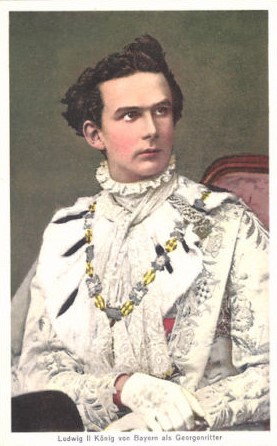 |
| Coupure de presse de The Manawatu Standard, vol. XII, n°1741, du 23 juin 1886 |
Dans The tragedy of a throne, la biographie de Louis II publiée par la Princesse Radziwill sous le pseudonyme d'Hildegarde Ebenthal, la Princesse rapporte qu'on disait que, sur son lit de mort, le roi Maximilien II aurait chuchoté ce quatrain des Centuries de Nostradamus à l'oreille de son fils aîné le Prince Louis, héritier du trône. La prophétie prenait encore davantage de signification pour les Rois de Bavière qui étaient Grand Maîtres de l'ordre de Saint-Georges. Voici le début du chapitre 3 de ce livre (pp.18 et 19):
ON the 10th of March, 1864, Maximihan II. of
Bavaria breathed his last somewhat unexpectedly,
that is to say, without any warning other than that
afforded by his usual state of ill-health. During the
short hours of the death struggle, he had time to bless
his eldest son and successor and to wish, so it is said,
that he might die as peacefully as himself, but recalling
at the same time an old prophecy of Nostradamus which,
for reasons I have not been able to ascertain, had been
somehow associated with the destinies of the House of
Wittelsbach.
This prediction, curious in view of what was to occur
later, ran thus :
" Quand le Vendredi Saint tombera sur le jour de
Saint George, Paques sur le jour de Saint Marc, et la
Fete Dieu sur le jour de Saint Jean, tout le Monde
pleurera."
St. George was considered the patron saint of
Bavaria, and the quaint saying just quoted had pre-
occupied the minds of many superstitious people in that
country. King Maximilian had not escaped its influence, and remembered it, as we have seen, when on his death bed, whilst Ludwig II. was haunted by it throughout his short existence, and told several persons that he
believed it to be associated with his reign, and that he
had been most painfully affected in finding that his
father, too, had spoken about it in his last hours.
 |
| Louis II en chevalier de l'ordre de Saint-Georges |

Aucun commentaire:
Enregistrer un commentaire